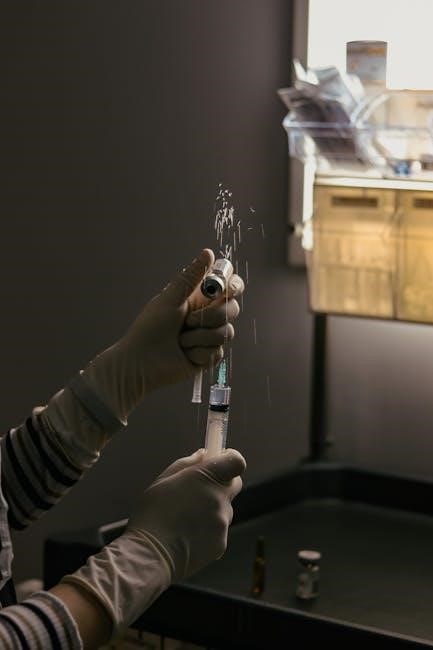Nursing pharmacology flash cards are a portable study tool designed to help nursing students and professionals master pharmacological concepts efficiently. They provide concise, key information on medications, including generic and brand names, dosages, and therapeutic uses, making them an essential resource for exam preparation and clinical practice.
1.1 What Are Nursing Pharmacology Flash Cards?
Nursing pharmacology flash cards are concise study tools designed to help nursing students and professionals master key medication information. These cards typically include details such as drug classes, generic and brand names, dosages, mechanisms of action, and therapeutic uses. They are often organized by drug categories or health conditions, making it easier to review and retain complex pharmacological data. Flash cards are particularly useful for preparing for exams like the NCLEX and for quick reference in clinical settings. They provide a portable and efficient way to learn and apply pharmacology knowledge, ensuring safe and effective medication administration in patient care.
1.2 Importance of Pharmacology in Nursing Education
Pharmacology is a cornerstone of nursing education, as it equips nurses with the knowledge to safely and effectively administer medications. Understanding drug mechanisms, dosages, and interactions is critical for preventing errors and ensuring patient safety. Nurses must grasp how medications affect the body and manage potential side effects, making pharmacology a vital skill. This knowledge also enables nurses to educate patients about their treatments, improving adherence and outcomes. In nursing education, pharmacology is emphasized to prepare students for real-world scenarios, ensuring they can make informed decisions in clinical practice and pass licensing exams like the NCLEX. It is essential for delivering high-quality, evidence-based patient care.
1.3 Why Use Flash Cards for Studying Pharmacology?
Flash cards are an effective study tool for mastering pharmacology due to their concise format, which simplifies complex information. They allow for active learning, enabling quick review of medication names, classes, and interactions. Portable and easy to use, flash cards facilitate spaced repetition, enhancing long-term retention. Nursing students can focus on high-yield medications, prioritize difficult topics, and test themselves frequently, reducing study time. Additionally, flash cards promote self-assessment, helping identify knowledge gaps. Their versatility makes them ideal for individual or group study, ensuring nurses are well-prepared for exams and clinical practice. Regular use of flash cards builds confidence and competence in pharmacology, a critical skill for patient care.

Key Concepts Covered in Nursing Pharmacology Flash Cards
Nursing pharmacology flash cards cover drug classes, mechanisms, and common medications for major health conditions. They also detail drug interactions, side effects, and nursing considerations for safe administration.
2.1 Drug Classes and Their Mechanisms
Nursing pharmacology flash cards organize drugs into classes, such as beta-blockers or anticoagulants, highlighting their mechanisms of action. For example, beta-blockers inhibit sympathetic nerve impulses, reducing heart rate and blood pressure. Each card explains how drugs interact with body systems, aiding in understanding their therapeutic and adverse effects. This classification helps nurses predict drug behaviors, ensuring safe administration. By focusing on drug families, flash cards simplify complex pharmacology, making it easier to memorize key details for exams and clinical practice. This structured approach enhances critical thinking and patient care decision-making, a cornerstone of nursing education and professional competence.
2.2 Common Medications for Major Health Conditions
Nursing pharmacology flash cards cover medications for prevalent conditions, such as hypertension, diabetes, and heart failure. For hypertension, cards include ACE inhibitors like lisinopril, which reduce blood pressure by inhibiting angiotensin-converting enzyme. Antiplatelet drugs like aspirin are featured for cardiovascular diseases, emphasizing their role in preventing clot formation. Diabetes medications, such as metformin, are detailed to highlight their mechanism in lowering blood glucose. Each card provides the drug’s class, use, dosage, and side effects, enabling nurses to quickly reference essential information. This focused approach ensures proficiency in managing chronic conditions, enhancing patient care and safety.
2.3 Drug Interactions and Side Effects
Nursing pharmacology flash cards emphasize critical drug interactions and side effects, essential for safe medication administration. For example, they highlight how NSAIDs can interact with antihypertensives, reducing their effectiveness. Common side effects, such as gastrointestinal upset with antibiotics, are also detailed. These cards help nurses recognize adverse reactions, such as allergic responses to penicillin, and understand how to manage them. By organizing this information concisely, flash cards enable quick reference, ensuring nurses can identify and mitigate potential harm, ultimately enhancing patient safety and care quality.
2.4 Nursing Considerations for Medication Administration
Nursing pharmacology flash cards highlight essential considerations for safe medication administration, such as patient assessment, right medication, right dose, right route, and right time. They emphasize the importance of patient education, including proper usage and potential side effects. Monitoring for adverse reactions and documenting responses are also key points. These cards often include tips for handling high-risk medications and managing special populations, like pediatrics or geriatrics. By focusing on these critical aspects, flash cards help nurses ensure safe, effective, and patient-centered care, reducing medication errors and improving clinical outcomes.

Benefits of Using Nursing Pharmacology Flash Cards
Nursing pharmacology flash cards enhance retention, offer portability for convenient studying, and promote active learning through quick reviews. They are ideal for exam preparation and clinical reference.
3.1 Enhanced Retention of Medication Information
Nursing pharmacology flash cards are a powerful tool for improving memory retention of medication details. By breaking down complex drug information into concise, digestible facts, these cards facilitate active recall and spaced repetition, key strategies for long-term retention. Students can review medications systematically, focusing on drug classes, mechanisms, and side effects, which reinforces understanding and reduces forgetting. The visual and tactile nature of flash cards also enhances memory encoding, making it easier to recall critical information during exams or clinical practice. Regular use ensures that nurses can quickly access essential drug knowledge, improving decision-making and patient care.
3.2 Portability and Convenience for Studying
Nursing pharmacology flash cards offer unparalleled portability and convenience, allowing students to study anywhere, anytime. Their compact size makes them easy to carry in a bag or pocket, enabling quick review sessions during breaks or commutes. Digital versions further enhance accessibility, with apps and PDFs allowing students to study on smartphones or tablets. This flexibility is particularly beneficial for nursing students, who often balance demanding schedules. Whether it’s a few minutes of review before class or a longer study session at home, flash cards adapt to any learning environment, ensuring consistent and efficient preparation for exams and clinical responsibilities.
3.3 Active Learning and Quick Review
Nursing pharmacology flash cards promote active learning by engaging students in hands-on review, fostering deeper retention of complex medication information. Unlike passive reading, flipping through flash cards encourages students to test their knowledge, reinforcing memory and understanding. The quick review feature allows learners to rapidly assess their grasp of key concepts, identifying areas needing additional focus. This method is particularly effective for high-yield topics, ensuring students are well-prepared for exams like the NCLEX. By simulating real-world scenarios, flash cards also enhance clinical decision-making skills, bridging the gap between theory and practice. Regular use strengthens critical thinking and recall, essential for patient care.
3.4 Improved NCLEX and Exam Preparation
Nursing pharmacology flash cards are a powerful tool for exam preparation, particularly for the NCLEX. They help students memorize key medications, their uses, and side effects, ensuring familiarity with high-yield content. Flash cards enable focused review of drug classes, mechanisms, and nursing considerations, aligning with exam priorities. Regular use enhances recognition of critical drug information, reducing test anxiety. Their portability allows for quick practice sessions, reinforcing knowledge retention. Many flash cards are designed specifically for NCLEX success, covering essential topics like pharmacological interventions and patient safety. By simulating exam-style questions, they prepare students for the format and content of the NCLEX, improving confidence and readiness for the real test.

How to Create Effective Nursing Pharmacology Flash Cards
Organize content clearly, use templates for structure, and incorporate visuals or mnemonics for better retention. Focus on high-yield medications and drug families, ensuring concise and relevant information for quick review.
4.1 DIY Flash Card Creation Tips
Creating DIY nursing pharmacology flash cards involves organizing key drug information concisely. Start by identifying high-yield medications and their essential details, such as generic and brand names, drug classes, mechanisms of action, dosages, and common side effects. Use templates or index cards to maintain consistency. Keep the content clear and avoid clutter by focusing on one concept per card. Incorporate visuals like diagrams or mnemonics to enhance retention. Review and update your cards regularly to reflect new information or clinical guidelines. For better organization, group cards by drug families or therapeutic uses, making them easier to study and reference during exams or clinical rotations.
4;2 Using Templates for Better Organization
Using templates for nursing pharmacology flash cards streamlines the creation process and ensures consistency. Templates typically include sections for drug names, classifications, mechanisms of action, dosages, and side effects, helping to organize information clearly. They save time by eliminating the need to design each card from scratch and reduce errors by providing a structured format. Many templates are available online, offering customizable fields to suit individual study needs. By using templates, you can focus on high-yield content, enhance retention, and maintain a professional appearance. This method also allows for easy updates and ensures that critical details are not overlooked, making studying more efficient and effective.
4.3 Incorporating Visual Aids and Mnemonics
Incorporating visual aids and mnemonics into nursing pharmacology flash cards enhances learning and retention. Visual elements like diagrams, charts, or icons help associate drugs with their mechanisms or effects. Mnemonics, such as acronyms or rhymes, simplify complex information, making it easier to recall. For example, using color-coded categories for drug classes or adding memory aids like “King Philip Came Over For Good Soup” for taxonomy can improve understanding. These techniques transform abstract pharmacological data into engaging, memorable content, reducing study time and boosting confidence. By integrating visuals and mnemonics, flash cards become a dynamic tool for mastering medication details and preparing for exams.
4.4 Digital Tools for Flash Card Creation
Digital tools offer convenience and efficiency in creating nursing pharmacology flash cards. Apps like Anki and Quizlet allow users to design customizable cards with multimedia features. Online platforms provide pre-made templates and libraries of pharmacology flash cards that can be downloaded as PDFs. Tools like Canva and Adobe Spark enable visually appealing designs, while cloud-based solutions ensure accessibility across devices. These tools streamline the creation process, making it easier to organize and review pharmacology content. Digital flash cards are particularly useful for nursing students, as they can be easily updated and shared, supporting active learning and exam preparation.

Popular Resources for Nursing Pharmacology Flash Cards
Top websites offer free PDF downloads, while recommended textbooks and online forums provide high-quality flash cards. Apps like Quizlet and Anki are popular for digital studying, ensuring easy access to pharmacology content.
5.1 Top Websites Offering Free PDF Downloads
Several websites provide free PDF downloads of nursing pharmacology flash cards, offering convenient access to study materials; Popular platforms include Quizlet, Nursing.com, and various nursing forums. These sites often feature pre-made flash cards covering drug classes, dosages, and therapeutic uses. Many resources are created by nursing educators or students, ensuring relevance and accuracy. Some websites also allow customization, enabling users to tailor cards to their specific needs; Additionally, open-access textbooks and educational blogs frequently share downloadable PDFs, making it easier for students to access high-quality study tools without cost. These resources are invaluable for exam preparation and clinical practice, ensuring nurses have quick reference guides at their fingertips.
5.2 Recommended Nursing Pharmacology Textbooks
Several textbooks are highly recommended for nursing pharmacology studies, complementing flash cards with in-depth information. Titles like Pharmacology and the Nursing Process by Lilley, Collins, and Snyder are widely praised for their comprehensive coverage of drug therapies. Other notable books include Pharmacology: A Patient-Centered Nursing Process Approach and Nursing Pharmacology Made Incredibly Easy. These textbooks provide detailed explanations of drug mechanisms, dosages, and patient care considerations. They often include case studies, key drug information, and practice questions, making them invaluable for both students and professionals. Regular updates ensure the content remains current with the latest pharmacological advancements, making these texts essential for building a strong foundation in nursing pharmacology.
5.3 Online Communities and Forums for Sharing Flash Cards
Online communities and forums are excellent platforms for sharing and accessing nursing pharmacology flash cards; Websites like Reddit’s r/nursingstudents and specialized nursing forums often feature user-created flash card sets for pharmacology. Platforms such as Quizlet and Nurse Labs also host shared flash cards, allowing students to collaborate and exchange study materials. These communities provide a space for nurses and students to discuss challenging topics, share resources, and gain insights into effective study strategies. By leveraging these forums, learners can expand their pharmacology knowledge and stay updated on the latest medications and clinical practices, enhancing their preparation for exams and real-world patient care scenarios.
5.4 Apps and Software for Digital Flash Cards

Digital flash card apps and software offer a modern and efficient way to study nursing pharmacology. Platforms like Anki, Quizlet, and Chegg allow users to create customizable digital flash cards or access pre-made decks. These tools often feature spaced repetition systems, enhancing retention of medication information. Apps such as Nursing Flashcards Pro and Pharmacology Flashcards by SimpleNursing provide comprehensive decks tailored for nursing students. Additionally, many apps support multimedia integration, including audio and images, making study sessions more engaging. These digital solutions are ideal for on-the-go learning, enabling nurses and students to review pharmacology concepts anytime, anywhere, and stay well-prepared for exams and clinical practice.

Advanced Tips for Using Nursing Pharmacology Flash Cards
Focus on high-yield medications, use spaced repetition, and prioritize drug families. Regular reviews and active learning techniques enhance retention and prepare for clinical scenarios effectively.
6.1 Prioritizing High-Yield Medications
High-yield medications are those frequently tested on exams like the NCLEX and are critical in clinical practice. Identify these drugs using study guides, practice questions, and instructor feedback. Focus on medications with high patient impact, such as antibiotics, anticoagulants, and antipsychotics. Prioritizing these ensures efficient study time management and enhances preparedness for both exams and real-world scenarios. Regularly review and update your flash cards to reflect the latest prescribing trends and evidence-based practices. This targeted approach helps build a strong foundation in pharmacology, ensuring confidence in medication administration and patient care.
6.2 Focusing on Drug Families and Classes
Organizing medications by drug families and classes simplifies learning, as related drugs share mechanisms of action and effects; For example, beta-blockers and ACE inhibitors are both used in cardiovascular care. Grouping drugs this way enhances understanding of their therapeutic uses and side effects. Flash cards can be categorized by drug classes, such as antibiotics, analgesics, or antipsychotics, making it easier to compare and contrast within each group. This method helps identify patterns, reducing the effort needed to memorize individual medications. By mastering drug classes, nurses can apply this knowledge to new or unfamiliar medications, improving both exam performance and clinical decision-making skills.
6.3 Regular Review and Spaced Repetition
Regular review of nursing pharmacology flash cards is essential for retaining medication information. Spaced repetition, a proven learning technique, involves reviewing cards at increasing intervals to enhance long-term retention. This method helps nurses master drug classes, mechanisms, and side effects more effectively. By consistently revisiting flash cards, students can identify knowledge gaps and reinforce understanding. Regular review also ensures that critical information remains accessible during high-pressure clinical situations. Incorporating spaced repetition into study routines optimizes learning efficiency, making it a valuable strategy for both exam preparation and lifelong professional development in nursing pharmacology.
6.4 Collaborative Study Groups Using Flash Cards
Collaborative study groups using nursing pharmacology flash cards foster active learning and peer-to-peer teaching. Students can quiz one another, reinforcing their understanding of medication classes, mechanisms, and side effects. This interactive approach encourages discussion, clarifying doubts and strengthening retention. Group sessions also allow for the sharing of diverse perspectives, enhancing problem-solving skills. By working together, students can identify and address knowledge gaps, making the learning process more dynamic and effective. Regular group reviews with flash cards not only improve individual mastery but also prepare nurses for real-world clinical scenarios, promoting teamwork and communication—essential skills in healthcare settings.

Common Mistakes to Avoid When Using Flash Cards
Overloading cards with excessive information and neglecting regular updates can hinder learning. Relying solely on flash cards without complementary study methods may lead to incomplete understanding of pharmacology concepts.

7.1 Overloading Flash Cards with Too Much Information
Overloading flash cards with excessive information can hinder effective learning. Each card should focus on key details, such as the drug’s name, class, and primary use, avoiding clutter. Too much text makes the content overwhelming and difficult to memorize. Instead, prioritize concise, clear information to enhance retention. For example, include the generic name, therapeutic use, and common side effects, but omit unnecessary details like every possible dosage form. This approach ensures that each flash card remains a focused study tool, promoting better understanding and active recall. Keeping the content streamlined helps nursing students and professionals master pharmacology concepts more efficiently. Simplify for success.
7.2 Neglecting to Review Less Familiar Medications
Neglecting to review less familiar medications is a common mistake that can lead to knowledge gaps in nursing pharmacology. While high-yield medications are often prioritized, less common drugs are equally important and may appear on exams or in clinical scenarios. Flash cards should include a broad range of medications, even those not frequently encountered, to ensure comprehensive understanding. Overlooking these can result in poor performance on exams like the NCLEX or HESI, where unexpected questions may arise. Regularly reviewing all medications, including less familiar ones, ensures a well-rounded knowledge base and prepares nurses for diverse patient care situations. Consistent review of all flash cards is essential for mastery.
7.3 Not Updating Flash Cards with New Information
Failing to update flash cards with new information can render them ineffective over time. Pharmacology is a rapidly evolving field, with constant advancements in drug therapies, dosages, and guidelines. Outdated flash cards may contain incorrect information, leading to confusion and errors in both study and clinical practice. Regularly updating flash cards ensures that nurses stay current with the latest developments, such as new drug approvals, contraindications, and treatment protocols. This is particularly crucial for exams like the NCLEX, where questions reflect the most recent clinical practices. Using digital tools or PDF updates can facilitate easy revisions, ensuring flash cards remain a reliable study resource. Regular updates are essential for maintaining accurate and relevant pharmacological knowledge.
7.4 Relying Solely on Flash Cards for Studying
Relying exclusively on flash cards for pharmacology study can lead to a superficial understanding of critical concepts. While flash cards are excellent for memorizing drug names, classifications, and dosages, they often lack the depth needed to comprehend complex pharmacological mechanisms and patient-specific considerations. Nurses should supplement flash cards with comprehensive textbooks, clinical case studies, and interactive learning tools to gain a holistic understanding of pharmacology. This integrated approach enhances critical thinking and problem-solving skills, which are vital for safe and effective medication administration. Sole reliance on flash cards may result in inadequate preparation for real-world clinical scenarios and standardized exams like the NCLEX, where applied knowledge is essential.

The Role of Flash Cards in Clinical Practice
Flash cards serve as quick reference tools for nurses, enhancing efficiency in verifying drug information, educating patients, and supporting continuing education in dynamic clinical environments.
8.1 Quick Reference for Nurses on the Job
Nursing pharmacology flash cards act as a portable, quick-reference tool for nurses, providing instant access to essential medication information. They help nurses verify drug details, such as generic and brand names, dosages, and potential interactions, during emergencies or routine patient care. This convenience ensures accuracy and efficiency in clinical decision-making. Flash cards are particularly useful for verifying less commonly prescribed medications or for confirming specific administration guidelines. By having critical pharmacological data at their fingertips, nurses can deliver safer, more effective care without relying on digital systems, which may not always be accessible. This portability enhances their ability to provide timely, evidence-based interventions in fast-paced healthcare environments.
8.2 Enhancing Patient Education with Flash Cards
Flash cards are an excellent tool for enhancing patient education in nursing. They provide clear, concise information about medications, including generic and brand names, dosages, side effects, and proper administration techniques. Nurses can use these flash cards to explain medications to patients in an easily understandable way, ensuring that patients are well-informed about their treatment. This can improve patient adherence to medication regimens and overall health outcomes. The portability of flash cards makes them ideal for use during bedside consultations, allowing nurses to provide accurate and consistent information efficiently. This resource not only educates patients but also empowers them to take an active role in their care.
8.3 Using Flash Cards for Continuing Education
Flash cards are a valuable resource for continuing education in nursing pharmacology, helping professionals stay updated on the latest medications and treatment guidelines. They provide a quick and accessible way to review complex pharmacological information, ensuring nurses remain knowledgeable about new drug developments and updates in clinical practices. The portability of flash cards allows nurses to review information during breaks or on the go, making continuous learning convenient. Additionally, digital flash card tools offer interactive features, such as quizzes and spaced repetition, to enhance retention. This makes them an essential tool for lifelong learning and professional development in the ever-evolving field of nursing pharmacology.
8.4 Sharing Knowledge with Colleagues
Flash cards are an excellent tool for sharing pharmacology knowledge among nursing colleagues, fostering collaborative learning and professional development. Nurses can distribute flash cards during in-service training or team meetings, ensuring everyone has access to the same standardized information. This promotes consistency in understanding and application of pharmacological concepts. Flash cards can also be used in peer-to-peer education, allowing experienced nurses to guide newer staff. The visual and concise format of flash cards makes complex information easy to share and discuss, enhancing team knowledge and improving patient care. This collaborative approach strengthens the nursing team’s collective expertise and readiness in clinical settings.
Nursing pharmacology flash cards are a versatile and essential tool for mastering medication knowledge, offering convenience, portability, and accessibility for nursing students and professionals alike.
9.1 Summary of the Importance of Nursing Pharmacology Flash Cards
Nursing pharmacology flash cards are a vital tool for both students and professionals, offering a portable and convenient way to master complex medication information. They provide quick access to essential details like drug classes, uses, dosages, and side effects, making them ideal for active learning and retention. By focusing on high-yield medications and common health conditions, these cards simplify exam preparation, particularly for the NCLEX. Additionally, they serve as a practical reference in clinical settings, ensuring accurate and efficient medication administration. Their structured format allows for easy review and updates, making them an indispensable resource for lifelong learning in nursing practice and education.
9.2 Final Tips for Maximizing Their Use
To maximize the effectiveness of nursing pharmacology flash cards, ensure they are personalized to your learning needs. Regularly review and update the cards with new information to keep them relevant. Use a combination of digital and physical formats for flexibility, and incorporate visual aids like diagrams or mnemonics to enhance retention. Prioritize high-yield medications and focus on understanding drug families rather than memorizing individual drugs. Collaborate with peers or study groups to test knowledge and share insights. Lastly, use spaced repetition and active recall techniques to reinforce learning and improve long-term retention of pharmacological concepts.
9.3 Encouragement for Lifelong Learning in Nursing
Lifelong learning is essential for nursing professionals to stay updated on pharmacological advancements and best practices. Nursing pharmacology flash cards serve as a valuable tool for continuous education, helping nurses quickly reference new medications, dosages, and therapeutic guidelines. Embrace a mindset of curiosity and growth, recognizing that learning doesn’t end with graduation. By regularly engaging with educational resources like flash cards, nurses can enhance their expertise and deliver evidence-based care. Stay proactive in seeking knowledge, as it not only advances your career but also improves patient outcomes. Invest time in learning, and trust that the effort will enrich your professional journey and contributions to healthcare.



